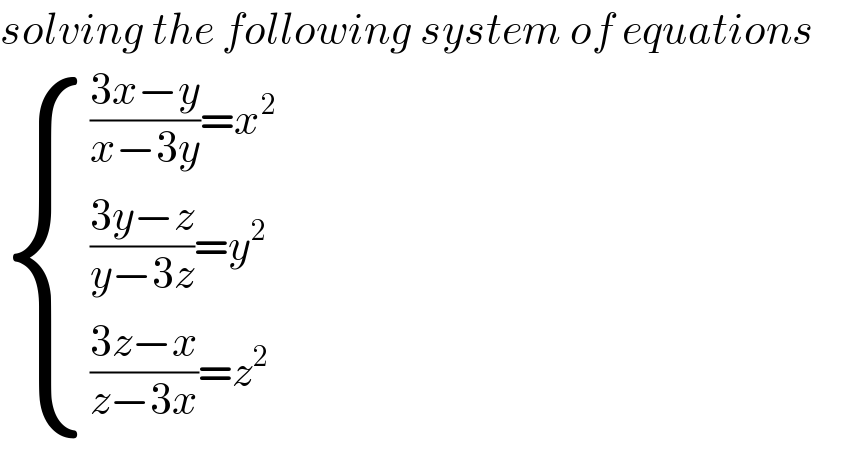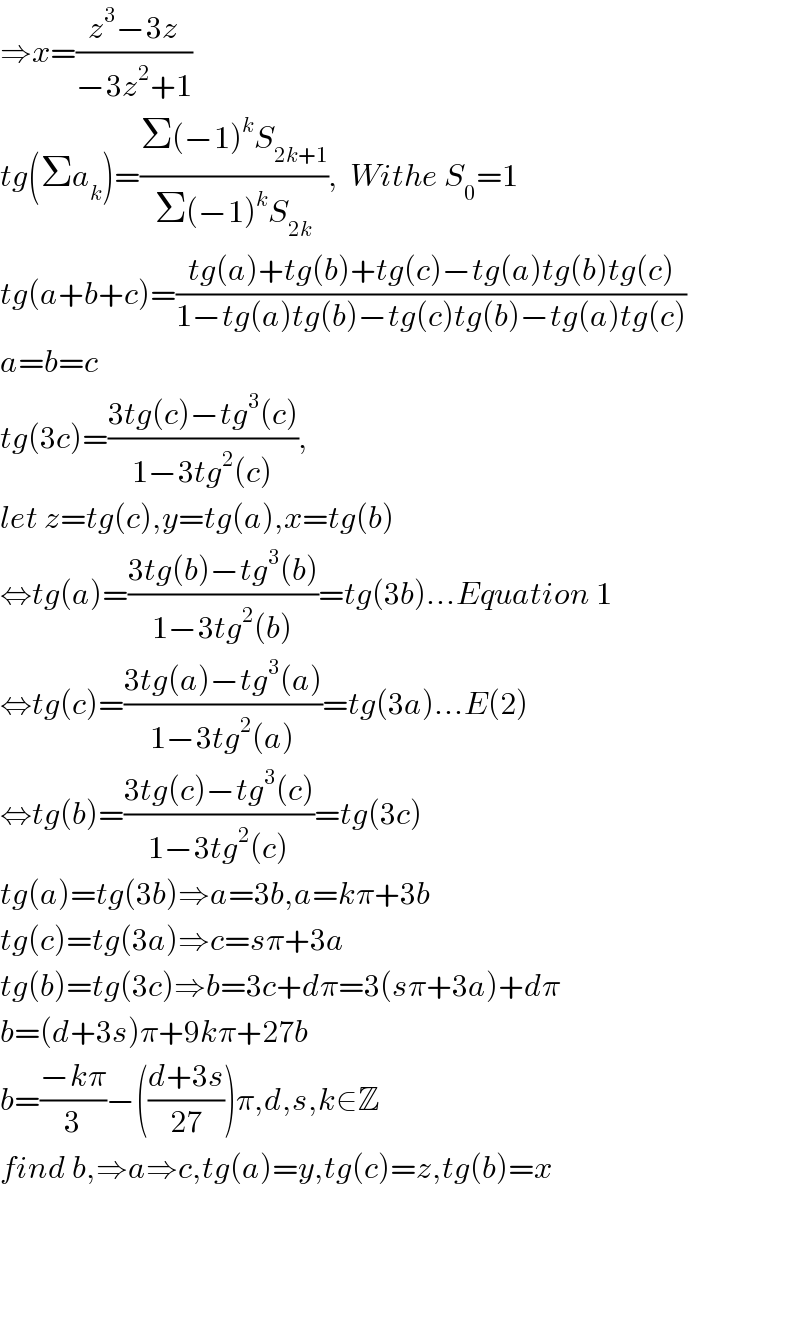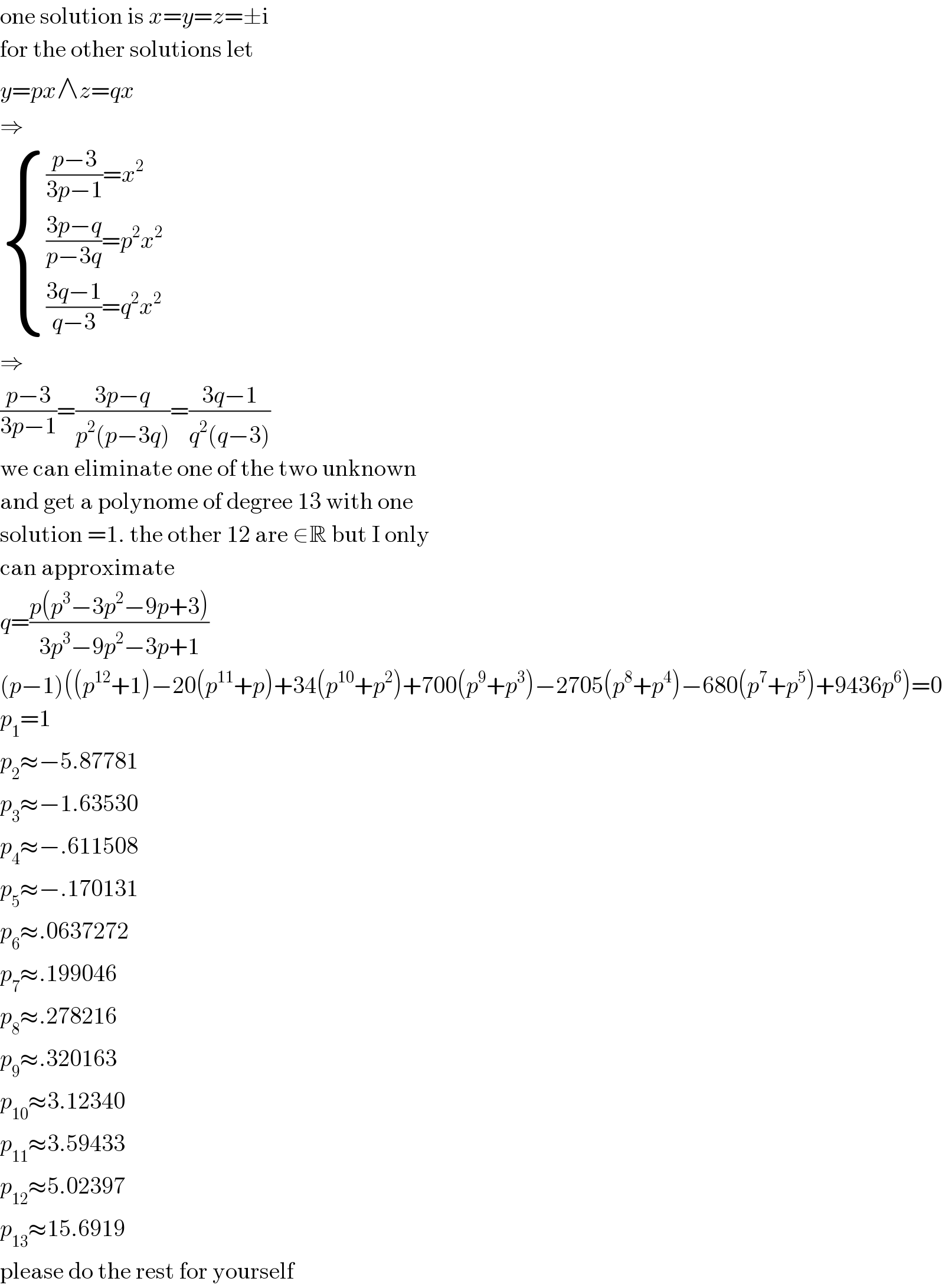
Question Number 119921 by bramlexs22 last updated on 28/Oct/20

$${solving}\:{the}\:{following}\:{system}\:{of}\:{equations} \\ $$$$\begin{cases}{\frac{\mathrm{3}{x}−{y}}{{x}−\mathrm{3}{y}}={x}^{\mathrm{2}} }\\{\frac{\mathrm{3}{y}−{z}}{{y}−\mathrm{3}{z}}={y}^{\mathrm{2}} }\\{\frac{\mathrm{3}{z}−{x}}{{z}−\mathrm{3}{x}}={z}^{\mathrm{2}} }\end{cases} \\ $$
Answered by mindispower last updated on 28/Oct/20

$$\Rightarrow{x}=\frac{{z}^{\mathrm{3}} −\mathrm{3}{z}}{−\mathrm{3}{z}^{\mathrm{2}} +\mathrm{1}} \\ $$$${tg}\left(\Sigma{a}_{{k}} \right)=\frac{\Sigma\left(−\mathrm{1}\right)^{{k}} {S}_{\mathrm{2}{k}+\mathrm{1}} }{\Sigma\left(−\mathrm{1}\right)^{{k}} {S}_{\mathrm{2}{k}} },\:\:{Withe}\:{S}_{\mathrm{0}} =\mathrm{1} \\ $$$${tg}\left({a}+{b}+{c}\right)=\frac{{tg}\left({a}\right)+{tg}\left({b}\right)+{tg}\left({c}\right)−{tg}\left({a}\right){tg}\left({b}\right){tg}\left({c}\right)}{\mathrm{1}−{tg}\left({a}\right){tg}\left({b}\right)−{tg}\left({c}\right){tg}\left({b}\right)−{tg}\left({a}\right){tg}\left({c}\right)} \\ $$$${a}={b}={c} \\ $$$${tg}\left(\mathrm{3}{c}\right)=\frac{\mathrm{3}{tg}\left({c}\right)−{tg}^{\mathrm{3}} \left({c}\right)}{\mathrm{1}−\mathrm{3}{tg}^{\mathrm{2}} \left({c}\right)}, \\ $$$${let}\:{z}={tg}\left({c}\right),{y}={tg}\left({a}\right),{x}={tg}\left({b}\right) \\ $$$$\Leftrightarrow{tg}\left({a}\right)=\frac{\mathrm{3}{tg}\left({b}\right)−{tg}^{\mathrm{3}} \left({b}\right)}{\mathrm{1}−\mathrm{3}{tg}^{\mathrm{2}} \left({b}\right)}={tg}\left(\mathrm{3}{b}\right)...{Equation}\:\mathrm{1} \\ $$$$\Leftrightarrow{tg}\left({c}\right)=\frac{\mathrm{3}{tg}\left({a}\right)−{tg}^{\mathrm{3}} \left({a}\right)}{\mathrm{1}−\mathrm{3}{tg}^{\mathrm{2}} \left({a}\right)}={tg}\left(\mathrm{3}{a}\right)...{E}\left(\mathrm{2}\right) \\ $$$$\Leftrightarrow{tg}\left({b}\right)=\frac{\mathrm{3}{tg}\left({c}\right)−{tg}^{\mathrm{3}} \left({c}\right)}{\mathrm{1}−\mathrm{3}{tg}^{\mathrm{2}} \left({c}\right)}={tg}\left(\mathrm{3}{c}\right) \\ $$$${tg}\left({a}\right)={tg}\left(\mathrm{3}{b}\right)\Rightarrow{a}=\mathrm{3}{b},{a}={k}\pi+\mathrm{3}{b} \\ $$$${tg}\left({c}\right)={tg}\left(\mathrm{3}{a}\right)\Rightarrow{c}={s}\pi+\mathrm{3}{a} \\ $$$${tg}\left({b}\right)={tg}\left(\mathrm{3}{c}\right)\Rightarrow{b}=\mathrm{3}{c}+{d}\pi=\mathrm{3}\left({s}\pi+\mathrm{3}{a}\right)+{d}\pi \\ $$$${b}=\left({d}+\mathrm{3}{s}\right)\pi+\mathrm{9}{k}\pi+\mathrm{27}{b} \\ $$$${b}=\frac{−{k}\pi}{\mathrm{3}}−\left(\frac{{d}+\mathrm{3}{s}}{\mathrm{27}}\right)\pi,{d},{s},{k}\in\mathbb{Z} \\ $$$${find}\:{b},\Rightarrow{a}\Rightarrow{c},{tg}\left({a}\right)={y},{tg}\left({c}\right)={z},{tg}\left({b}\right)={x} \\ $$$$ \\ $$$$ \\ $$$$ \\ $$
Answered by MJS_new last updated on 28/Oct/20

$$\mathrm{one}\:\mathrm{solution}\:\mathrm{is}\:{x}={y}={z}=\pm\mathrm{i} \\ $$$$\mathrm{for}\:\mathrm{the}\:\mathrm{other}\:\mathrm{solutions}\:\mathrm{let} \\ $$$${y}={px}\wedge{z}={qx} \\ $$$$\Rightarrow \\ $$$$\begin{cases}{\frac{{p}−\mathrm{3}}{\mathrm{3}{p}−\mathrm{1}}={x}^{\mathrm{2}} }\\{\frac{\mathrm{3}{p}−{q}}{{p}−\mathrm{3}{q}}={p}^{\mathrm{2}} {x}^{\mathrm{2}} }\\{\frac{\mathrm{3}{q}−\mathrm{1}}{{q}−\mathrm{3}}={q}^{\mathrm{2}} {x}^{\mathrm{2}} }\end{cases} \\ $$$$\Rightarrow \\ $$$$\frac{{p}−\mathrm{3}}{\mathrm{3}{p}−\mathrm{1}}=\frac{\mathrm{3}{p}−{q}}{{p}^{\mathrm{2}} \left({p}−\mathrm{3}{q}\right)}=\frac{\mathrm{3}{q}−\mathrm{1}}{{q}^{\mathrm{2}} \left({q}−\mathrm{3}\right)} \\ $$$$\mathrm{we}\:\mathrm{can}\:\mathrm{eliminate}\:\mathrm{one}\:\mathrm{of}\:\mathrm{the}\:\mathrm{two}\:\mathrm{unknown} \\ $$$$\mathrm{and}\:\mathrm{get}\:\mathrm{a}\:\mathrm{polynome}\:\mathrm{of}\:\mathrm{degree}\:\mathrm{13}\:\mathrm{with}\:\mathrm{one} \\ $$$$\mathrm{solution}\:=\mathrm{1}.\:\mathrm{the}\:\mathrm{other}\:\mathrm{12}\:\mathrm{are}\:\in\mathbb{R}\:\mathrm{but}\:\mathrm{I}\:\mathrm{only} \\ $$$$\mathrm{can}\:\mathrm{approximate} \\ $$$${q}=\frac{{p}\left({p}^{\mathrm{3}} −\mathrm{3}{p}^{\mathrm{2}} −\mathrm{9}{p}+\mathrm{3}\right)}{\mathrm{3}{p}^{\mathrm{3}} −\mathrm{9}{p}^{\mathrm{2}} −\mathrm{3}{p}+\mathrm{1}} \\ $$$$\left({p}−\mathrm{1}\right)\left(\left({p}^{\mathrm{12}} +\mathrm{1}\right)−\mathrm{20}\left({p}^{\mathrm{11}} +{p}\right)+\mathrm{34}\left({p}^{\mathrm{10}} +{p}^{\mathrm{2}} \right)+\mathrm{700}\left({p}^{\mathrm{9}} +{p}^{\mathrm{3}} \right)−\mathrm{2705}\left({p}^{\mathrm{8}} +{p}^{\mathrm{4}} \right)−\mathrm{680}\left({p}^{\mathrm{7}} +{p}^{\mathrm{5}} \right)+\mathrm{9436}{p}^{\mathrm{6}} \right)=\mathrm{0} \\ $$$${p}_{\mathrm{1}} =\mathrm{1} \\ $$$${p}_{\mathrm{2}} \approx−\mathrm{5}.\mathrm{87781} \\ $$$${p}_{\mathrm{3}} \approx−\mathrm{1}.\mathrm{63530} \\ $$$${p}_{\mathrm{4}} \approx−.\mathrm{611508} \\ $$$${p}_{\mathrm{5}} \approx−.\mathrm{170131} \\ $$$${p}_{\mathrm{6}} \approx.\mathrm{0637272} \\ $$$${p}_{\mathrm{7}} \approx.\mathrm{199046} \\ $$$${p}_{\mathrm{8}} \approx.\mathrm{278216} \\ $$$${p}_{\mathrm{9}} \approx.\mathrm{320163} \\ $$$${p}_{\mathrm{10}} \approx\mathrm{3}.\mathrm{12340} \\ $$$${p}_{\mathrm{11}} \approx\mathrm{3}.\mathrm{59433} \\ $$$${p}_{\mathrm{12}} \approx\mathrm{5}.\mathrm{02397} \\ $$$${p}_{\mathrm{13}} \approx\mathrm{15}.\mathrm{6919} \\ $$$$\mathrm{please}\:\mathrm{do}\:\mathrm{the}\:\mathrm{rest}\:\mathrm{for}\:\mathrm{yourself} \\ $$
